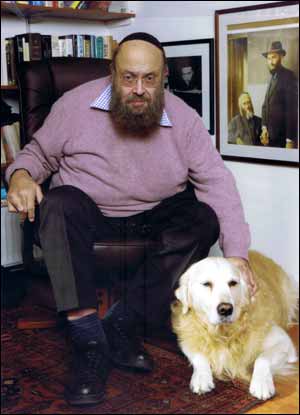|
PROFILE Why Freud hid his chassidic roots | |
However, a new book reveals that Vienna-raised Freud's ancestors were chassidim going back many generations - and included famous rabbis. Dr Joseph Berke, in The Hidden Freud: His Hassidic Roots (Karmac Books), also considers how the ideas of kabbala and chassidism profoundly shaped and enriched the father of psychoanalysis' understanding of mental processes and clinical practices. "His parents were Polish Jews from the Galicia area, but Freud was keen to play down his background," Dr Berke said. "At one point, he even claimed he came from a Sephardi background." The book also discusses Freud's relationship to kabbala while he was developing his science of subjectivity. It involved systematic exploration of human experience, uncovering the secret compartments and deepest levels of the mind, expanding human consciousness and the revelation of hidden, unconscious thought processes by free association and dream analysis. They are all linked to kabbalistic forms of thinking. Dr Berke explained: "Jews have a natural tendency for introspection. "We are interested in the deeper meaning of why we do what we do - we are always thinking deeply. "The overt Freud was assimilated, while the covert Freud was more into the Jewish concept." Dr Berke, 76, uses meetings which took place in 1903 between Freud and the fifth Lubavitcher Rebbe, the Rebbe Rashab, as a point of departure to consider Freud's Jewish identity. "While Freud may have felt himself to be completely estranged from the religion of his fathers, he still remained a man who never repudiated his people, who felt that he was in his essential nature a Jew, and who had no desire to alter that nature, as so many of his colleagues had done," he said. "Freud came from a frum family, but rejected organised observance. "In January, 1903, the Rebbe was suffering from a loneness of spirit. It was the yarhzeit of his father and he was being persecuted by the Russian government. "The Rebbe sought help from the best person he could find - Freud. "They had many discussions and Freud gave the Rebbe simple advice." The Hidden Freud also reflects on Freud's many distinguished descendants, including child psychoanalyst Anna, painter Lucian, politician and TV personality Clement and publicist Matthew. Dr Berke, who lives in London, was born in Newark, New Jersey. His mother Rose (nee Friedlander) had moved to America from Manchester, the daughter of a Romanian mother. She met Joseph Berke, who was of Ukrainian descent, in America. His father had refused to support him when he landed a place at the prestigious Cornell University. Joseph went on to develop rheumatic fever and died from an embolism in his lungs before his son - Dr Berke - was born. Dr Berke added: "My mother had polycystic ovaries and was told she could never have children. "When she stopped having periods, she was told it was a grief-reaction to my father's death. "But she was told she was definitely pregnant when she was seven months gone." Dr Berke studied at Columbia University and graduated from New York's Albert Einstein College of Medicine. He said: "I was a young Jewish doctor who didn't like the sight of blood. "So, I did what any young Jewish doctor who didn't like the sight of blood does - I became a psychiatrist." He moved to London in 1965 where he worked with prominent Scottish psychiatrist RD Laing. Dr Berke helped Mary Barnes, a middle-aged nurse who had been diagnosed with schizophrenia, to pass through a severe regression. She later became a noted artist, writer and mystic. Mary Barnes: Two Accounts of a Journey Through Madness, which she and Dr Berke co-authored, was adapted as a stage play and has been performed in many countries. It has now been optioned as a film. Dr Berke, who currently works as a psychoanalytic psychotherapist for individuals and families, also founded, with colleagues, the Arbours Housing Association in London to provide personal, psychotherapeutic care and shelter for people in emotional distress. He became a ba'al teshuva (returnee to Judaism) in the 1990s. The grandfather-of-five and father-of-two recalled: "When I was at medical school, a group of us said we were going to make contact with different Jewish organisations. "I suggested Lubavitch, but my colleagues said, 'no, they'll grab you'. Years later they did. "I feel much more at ease with myself and it has given me a deeper understanding of people."
|
 INTROSPECTION: Dr Joseph Berke
INTROSPECTION: Dr Joseph Berke